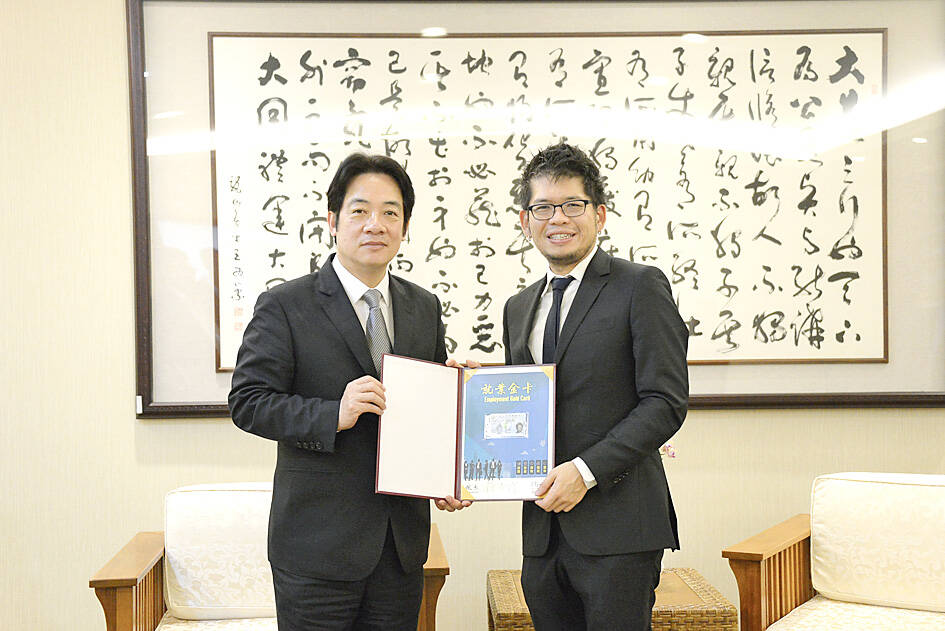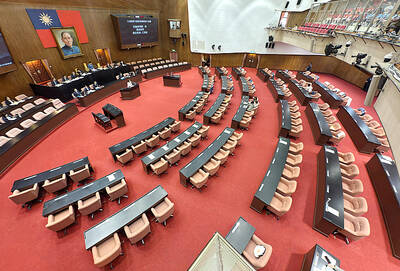Applications for the Employment Gold Card have increased in the past few years, with the card having been issued to a total of 13,191 people from 101 countries since its introduction in 2018, the National Development Council (NDC) said yesterday.
Those who have received the card have included celebrities, such as former NBA star Dwight Howard and Australian-South Korean cheerleader Dahye Lee, the NDC said.
The four-in-one Employment Gold Card combines a work permit, resident visa, Alien Resident Certificate (ARC) and re-entry permit. It was first introduced in February 2018 through the Act Governing Recruitment and Employment of Foreign Professionals (外國專業人才延攬及雇用法), and initially failed to gain traction, it said.

Photo courtesy of the National Development Council
“The aim of the card is to attract foreign professionals with special expertise in various fields, including technology, economics, education, arts and culture, sports, finance, law, architecture, national defense, and the digital industries,” it said.
“The policy is designed to create a more friendly environment for work and residency, encouraging foreign talent to come to and remain in Taiwan,” it added.
In the first year following the card’s introduction, only 188 cards were issued, and by the end of 2019, that number had grown to just 546, it said.

Photo courtesy of Executive Yuan
However, the effectiveness of Taiwan’s response to the COVID-19 pandemic following its outbreak in 2020, as well as the resilience of Taiwan’s economy throughout the pandemic, led to a surge in applications for the card, it said.
By the end of 2020, the number of cards issued had jumped to 1,945, it added.
“The visibility of the Employment Gold Card improved significantly in the years that followed,” an official from the Workforce Development Agency said, adding that by the end of last year, 10,000 cards had already been issued.

Photo courtesy of the National Immigration
Americans have accounted for the largest percentage of the applicants, making up 25 percent in total, while Hong Kong residents and Japanese were the second and third-largest groups respectively, the official said.
“This trend can likely be explained by the strong state of Taiwan-US ties, and the large number of Taiwanese who have studied and settled in the US,” they added.
“Many second and third-generation Taiwanese Americans are now returning to Taiwan for work, which greatly benefits Taiwan’s economic development,” the official said.
The first Employment Gold Card was awarded to Steve Chen (陳士駿), the Taiwan-born American entrepreneur and cofounder of YouTube, they said, adding that Chen was presented the card by then-premier William Lai (賴清德) in recognition of his willingness to contribute his expertise in technology and management to Taiwan.
The high number of applicants from Japan, which increased in 2022 and has continued to grow since, is likely due to Japan’s proximity to Taiwan, as well as the strong economic ties between the two countries, they said.
“Although Japanese employees in Taiwan can be sponsored by companies for work permits, the Employment Gold Card offers more flexibility and better conditions, making it a popular alternative,” they said.
India has also grown as a source of applicants for the card, which benefits Taiwan given India’s expertise in technology and software, they said.
The NDC has identified Bengaluru, India, as a key international talent recruitment zone, they added.
“The issuance of cards to celebrities helps the program gain recognition. For example, Dwight Howard received a card for his outstanding sports achievements,” they said.
“Lee received one in August 2024 under the Ministry of Culture’s recommendation, based on her cultural and artistic contributions to Taiwan, and her role in promoting Taiwan-South Korea exchanges,” the official added.
To further bolster the program, the NDC has proposed amendments to the foreign-talent recruitment law, they said.
Draft amendments have passed review by the Executive Yuan and, pending approval by the Legislative Yuan, could be implemented by the end of this year, if passed in the current session, the official said.

CROSS-STRAIT COLLABORATION: The new KMT chairwoman expressed interest in meeting the Chinese president from the start, but she’ll have to pay to get in Beijing allegedly agreed to let Chinese Nationalist Party (KMT) Chairwoman Cheng Li-wun (鄭麗文) meet with Chinese President Xi Jinping (習近平) around the Lunar New Year holiday next year on three conditions, including that the KMT block Taiwan’s arms purchases, a source said yesterday. Cheng has expressed interest in meeting Xi since she won the KMT’s chairmanship election in October. A source, speaking on condition of anonymity, said a consensus on a meeting was allegedly reached after two KMT vice chairmen visited China’s Taiwan Affairs Office Director Song Tao (宋濤) in China last month. Beijing allegedly gave the KMT three conditions it had to

‘BALANCE OF POWER’: Hegseth said that the US did not want to ‘strangle’ China, but to ensure that none of Washington’s allies would be vulnerable to military aggression Washington has no intention of changing the “status quo” in the Taiwan Strait, US Secretary of Defense Pete Hegseth said on Saturday, adding that one of the US military’s main priorities is to deter China “through strength, not through confrontation.” Speaking at the annual Reagan National Defense Forum in Simi Valley, California, Hegseth outlined the US Department of Defense’s priorities under US President Donald Trump. “First, defending the US homeland and our hemisphere. Second, deterring China through strength, not confrontation. Third, increased burden sharing for us, allies and partners. And fourth, supercharging the US defense industrial base,” he said. US-China relations under

The Chien Feng IV (勁蜂, Mighty Hornet) loitering munition is on track to enter flight tests next month in connection with potential adoption by Taiwanese and US armed forces, a government source said yesterday. The kamikaze drone, which boasts a range of 1,000km, debuted at the Taipei Aerospace and Defense Technology Exhibition in September, the official said on condition of anonymity. The Chungshan Institute of Science and Technology and US-based Kratos Defense jointly developed the platform by leveraging the engine and airframe of the latter’s MQM-178 Firejet target drone, they said. The uncrewed aerial vehicle is designed to utilize an artificial intelligence computer

The Chinese Nationalist Party (KMT) caucus yesterday decided to shelve proposed legislation that would give elected officials full control over their stipends, saying it would wait for a consensus to be reached before acting. KMT Legislator Chen Yu-jen (陳玉珍) last week proposed amendments to the Organic Act of the Legislative Yuan (立法院組織法) and the Regulations on Allowances for Elected Representatives and Subsidies for Village Chiefs (地方民意代表費用支給及村里長事務補助費補助條例), which would give legislators and councilors the freedom to use their allowances without providing invoices for reimbursement. The proposal immediately drew criticism, amid reports that several legislators face possible charges of embezzling fees intended to pay